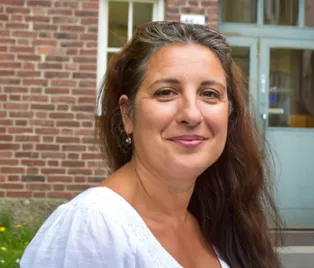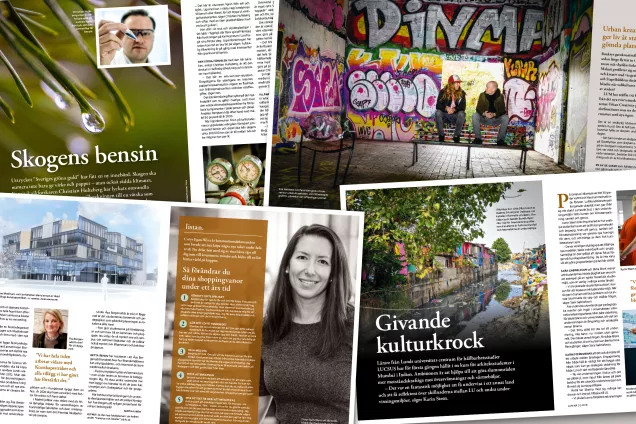“I think it was naïve to think that if men took on a larger part of the burden, the outcome would be better for everyone. If the fatherhood ideal drives men in a direction as crazy as the ideal of motherhood did for women, there is a risk that both men and women will suffer”, says Elia Psouni.
The paternal role has changed over recent decades. The traditional – and stereotypical – image rests on the woman taking care of the home and the children, while the man focuses on his career and brings in the money. This has changed more and more over time, and in many cases men are taking an increasingly active part in parenting. But it has not always been easy for the dads. The myth of motherhood holds that women are better suited to being parents and the man’s role as a parent often depends on the mother’s consent. It becomes a negotiation in which the woman “allocates” a parental role to the man in everyday life.
“Many men do not have a clear-cut image of how they want to be as parents based on what their fathers were like, as men previously did not participate in child-raising as current fathers wish to. This is a burden for many men. But perhaps being an active parent is not so much about gender at all. Maybe men could look to their mothers or other women as role models instead”, says Elia Psouni.
At the same time, it is not entirely easy to live up to your ideals, even if you have the will, and different stages in the child’s development place different demands on this ambition.
“For us, it got difficult when our children became teenagers. I became aware of my own wish that my husband would take on the traditional father role of being strict and setting limits, despite never having had that role before. Often, we haven’t thought through how we want our roles to be over the span of the child’s upbringing”, says Elia Psouni.
Sharing parental leave, taking time off work to care for a sick child and suchlike is not sufficient to achieve gender equality. An increasing number of days off work for new fathers will not solve the problem either, according to Elia Psouni. In addition to these measures, a continuous, ongoing intimate negotiation between the mother and the father is required, which takes both time and energy. How well family members can negotiate and what expectations we have determines to a certain extent what parental roles we assume.
“How well we succeed depends on this. In the best case scenario, we want sensitive and receptive men but, at the same time, we want them to have sufficient perspective and balance to manage the I-want-mummy-phase without getting upset. At that time, they have to be prepared to remain on standby without disappearing off to pursue other interests.”
The transformation of the dad into a more significant figure in the child’s life has a cost, including a financial one. Parents can easily fall back into traditional roles. Professional life has not kept up with the changes in other parts of society over the past decades either. Women are still expected to see their careers as secondary once they have children, whereas men are often met with a lack of understanding from their managers, who expect them to prioritise their jobs over everything else, rather than staying home to care for a sick child or anything else that concerns family life”, says Elia Psouni.
However, a lot of research on women reveals where such a path leads. It is barely possible for women in full-time work who are parents to have a guilt-free day – the 24 available hours are not sufficient and they always feel they are neglecting something.
Schools and public health care have not kept up either; the old gender perspectives persist to a varying extent. When it comes to parental roles, public healthcare has a very female perspective. There are many studies showing that some women suffer from postpartum depression. Meanwhile, the number of unrecorded cases among men is high. Elia Psouni recently published a study showing that the established methods for detecting depression among new mothers work poorly on fathers.
She thinks that the traditional image of parenthood was simpler when there was barely any overlap between women’s and men’s respective areas of responsibility. There was no need to get one another’s approval and it was very clear whose area of responsibility was whose. This also meant that there wasn’t the same need to communicate and distribute the work.
“My parents didn’t understand what the negotiations were about when my husband and I became parents and embarked on parenting together. My mother told me that I should do as I pleased – but I couldn’t as there were two of us sharing the responsibility and dealing with it together. Because it is not about sharing the work 50-50, after all, but rather about much of it being dedicated to negotiation on the micro-level, about how to do each task.
I think you have to start with the day being made up of 24 hours. That is how it is, it’s non-negotiable. Then you have to find out how to parent together, how to share the task in practice, so that the needs of the child are met while the parents can both safeguard their own relationship and have time for other things. It is easier said than done, and at certain stages you have to accept that there just isn’t time for anything else”.
If parents don’t succeed in this, they risk setbacks. It is relatively common for women to suffer from exhaustion and depression, and the risk is that people then think it is easier to do things as they were done in the past, which takes development in the wrong direction.
“It was not only women who wanted change. Many men also felt that they were not suited to the strict stereotypes of the male role. Within developmental psychology, we know that children thrive on having several close role models with different characteristics. Children are also less vulnerable if they are not dependent on one person only, but have several sources of security”, says Elia Psouni.
Jonas Andersson



